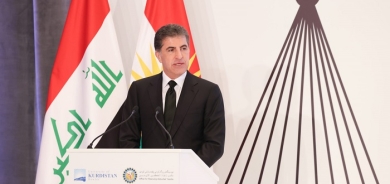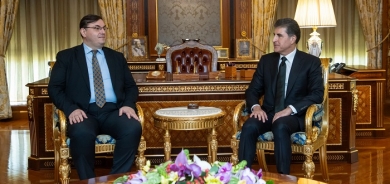Military expert: Iraqi Army must do its part before Hawija is liberated

Col. Masoud Salih, a military expert and instructor at the Zakho Military Academy, says that the Iraqi Army must be involved in the liberation of Hawija, a district in Kirkuk province and a stronghold of the Islamic State group (ISIS), which is known in Arabic as Daesh. “There are strategic areas in southern Hawija that should be liberated by the Iraqi army first,” he said in an interview with Rudaw. Salih, 35, is a veteran officer. Following the fall of former Iraqi dictator Saddam Hussein he fought alongside US combat forces and took part in the battles for Fallujah and Ramadi in 2004. A year later, he served as a military commander alongside the US Special Forces. Salih explained that the most recent offensive west of Kirkuk city has brought the Peshmerga forces 20 kilometers outside Hawija. This last push was the fourth major offensive in the area for Kurdish fighters, he said. Here is Rudaw’s full interview with the commander:
Rudaw: What next for the Peshmerga?
Col. Masoud Salih: The Peshmerga successfully accomplished their missions of liberating villages. The reason for the Peshmerga operation west of Kirkuk was to remove any future possible assaults Daesh might launch against the Peshmerga. It was also to fortify Peshmerga positions, as well as to surround the Daesh stronghold town of Hawija, from where most of the attacks have been launched.
Will the Peshmerga continue to push toward the Daesh stronghold, or are they simply trying to hold the new line?
The recent Peshmerga advances are meant to cut off Daesh’s supply line for its occupied villages in Makhmour and the center of the city of Shingal. Daesh recently launched sporadic attacks against the Peshmerga in Makhmour, which resulted in the deaths of civilians and the Peshmerga, and they also fired random rockets at the town. Hawija and Gayara are two Daesh strongholds. With the liberation of these towns -- whether by the Peshmerga or the Iraqi Army – Daesh will suffer militarily and it will be a major blow to the group's capabilities.
What is keeping the Peshmerga from pushing closer to Hawija and eventually attacking the city?
The only reason that is pushing the Peshmerga to encircle Hawija is that the extremist group still poses a threat to Kirkuk and its surrounding areas.
The military tactics for a massive assault by Daesh in early February were laid out in Hawija, and the militants prepared their forces there. Also, many other sporadic attacks followed the February attack, resulting in the deaths of dozens of Peshmerga and the capture of many other captives.
During Wednesday’s Peshmerga campaign to liberate several villages in western Kirkuk, the Kurdish forces abandoned the complex of Mansouria. Why is that? Was there any order by Peshmerga commanders?
According to scientific military discipline, when you first liberate an area you should advance to a point, then you plan how to advance for the next five kilometers. This was not done yesterday. Many Peshmerga were ambushed by the remaining Daesh elements in the complex. Fortunately, they were all rescued by a back-up Peshmerga force. Plenty of landmines and booby traps laid by Daesh in the complex halted the Peshmerga from advancing further, because that would inflict heavy casualties among the Peshmerga.
How sophisticated are the booby traps and landmines laid by Daesh? Is this one of the main factors holding back the Peshmerga? How do you get rid of the landmines?
Daesh has powerful military engineers in the group's self-proclaimed capital of Raqqa in Syria. They have factories manufacturing booby traps and landmines in Raqqa, which are then distributed to their controlled areas in Iraq and Syria. Whenever there is an attack against them (Daesh), they ambush the forces -- including the Peshmerga, the Iraqi army and forces in Syria -- with landmines. I can’t say booby traps and landmines are the only factors holding the Peshmerga back, because sometimes the Peshmerga lack military coordination.
Will the Peshmerga and coalition forces eventually take Hawija? What needs to happen before the city is liberated, and do the people of Hawija support Daesh?
No time frame has been set by the Peshmerga and the US-led coalition. There are strategic areas in southern Hawija that should be liberated by the Iraqi army first, including the oil-refinery town of Baiji and Hazar in Salahadin province, and then Baaj and Tal Afar in Mosul. When all these areas are liberated, Hawija can easily been surrounded from all fronts. I dare say the Iraqi army has slowed the liberation process of Hawija, not the Peshmerga or the US coalition. The Peshmerga say they will only move further against Daesh under orders from higher authorities, and that any offensive on Hawija would need to be led by the Iraqi army and Shiite militias, especially Hashd al-Shaabi.
What is the strategic value of Hawija?
Hawija is located east of Mosul and is the largest populated town, where 400,000 people there. Hawija is very strategic for Daesh because many of the group's weapons depots and bomb manufacturing factories are there. The people of Hawija are supporting Daesh, and that is what made the group strong in the town. Hawija links Mosul to eastern areas of the province of Diyala. The town has many thick forests where Daesh hides its militants from airstrikes or ground assaults.
The longer Daesh holds Hawija and other territories, the more difficult it will become to liberate these areas, since Daesh will continue setting up booby traps and fortifying their bunkers, as well as influence the civilians in the cities. Is that correct?
I have two answers: one is, as long as Daesh stays in the town it will receive local support since its southern neighboring areas, like Baiji and Hazar, are still held by them and they can supply their forces without any fear. In this way they can fortify their fronts with the Iraqi army and the Peshmerga. Secondly, Daesh does not have good relations with Sunni tribes and a portion of the people of Hawija these days. Therefore, the longer they stay the weaker they could get.
This time last year, experts were predicting Hawija and Mosul would be liberated by now. What happened to the sense of urgency? Is Daesh getting stronger?
With Russia's involvement in the fight against Daesh, a major event occurred in the region, dividing the Russian-Iranian bloc on one side, and the US bloc on the other. Russia based its troops in the city of Latakia in Syria. Iraq was split into a Russian-Iranian bloc and an American bloc. Therefore, the US retreated from striking Daesh’s Sunni held territories in Iraq. A few days ago an operation center between Iraq, Russia and Iran was formed, aiming to coordinate in fighting Daesh in Iraq. I believe Russia will actively take part in the fight against Daesh in Iraq soon.
Rudaw















